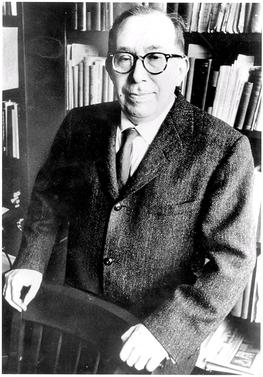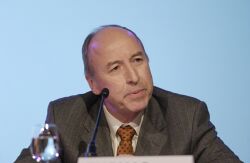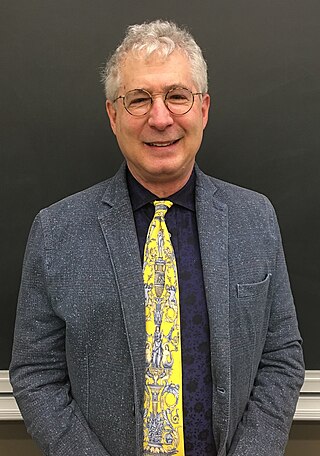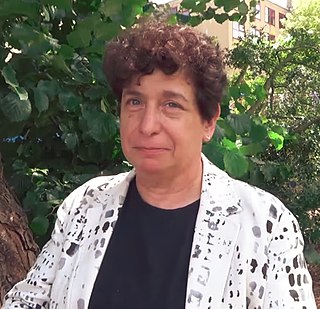Related Research Articles

Leo Strauss was a German-American scholar of political philosophy who specialized in classical political philosophy. Born in Germany to Jewish parents, Strauss later emigrated from Germany to the United States. He spent much of his career as a professor of political science at the University of Chicago, where he taught several generations of students and published fifteen books.

Persecution and the Art of Writing, published in 1952 by the Free Press, is a book of collected articles written by Leo Strauss. The book contains five previously published essays, many of which were significantly altered by Strauss from their original publication:
- Introduction
- Persecution and the Art of Writing
- The Literary Character of the Guide to the Perplexed
- The Law of Reason in the Kuzari
- How to Study Spinoza's Theologico-Political Treatise

Alexandre Kojève was a Russian-born French philosopher and statesman whose philosophical seminars had an immense influence on 20th-century French philosophy, particularly via his integration of Hegelian concepts into twentieth-century continental philosophy. As a statesman in the French government, he was instrumental in the formation of the European Union.
Harry Victor Jaffa was an American political philosopher, historian, columnist, and professor. He was a professor emeritus at Claremont McKenna College, Claremont Graduate University, and was a distinguished fellow of the Claremont Institute. Robert P. Kraynak says his "life work was to develop an American application of Leo Strauss's revival of natural-right philosophy against the relativism and nihilism of our times".
The Calgary School is a term coined by Ralph Hedlin in an article in the now defunct Alberta Report in reference to four political science professors – Tom Flanagan, Rainer Knopff, Ted Morton, and Barry F. Cooper – who became colleagues at Alberta's University of Calgary in the early 1980s. They shared and promoted similar ideas about how political scientists could shape the rise of a particular kind of conservatism in Canada – informed by theories based on Friedrich Hayek and Leo Strauss. Cooper and Flanagan had met in the 1960s at Duke University while pursuing doctoral studies, while Knopff and Morton were both mentored by Walter Berns, a prominent Straussian, at the University of Toronto. They were economic, foreign policy, and social conservatives who were anti-abortion and were not in favour of legalizing gay marriage. They supported Stephen Harper in his 1993 election campaign, and former Alberta premiers Ralph Klein and Jason Kenney. A fifth University of Calgary professor, David Bercuson, co-authored publications with Cooper but was more loosely associated with the group and, at times, disagreed with the others on these public policies and candidates.

David Novak, is a Jewish theologian, ethicist, and scholar of Jewish philosophy and law (Halakha). He is an ordained Conservative rabbi and holds the J. Richard and Dorothy Shiff Chair of Jewish Studies as Professor of the Study of Religion and Professor of Philosophy at the University of Toronto since 1997. His areas of interest are Jewish theology, Jewish ethics and biomedical ethics, political theory, and Jewish-Christian relations.
James R. Stoner Jr. is Hermann Moyse Jr. Professor and Director of the Eric Voegelin Institute in the Department of Political Science at Louisiana State University. Stoner specializes in political theory, English common law, and American constitutionalism.

Thomas Lee Pangle, is an American political scientist. He holds the Joe R. Long Chair in Democratic Studies in the Department of Government and is Co-Director of the Thomas Jefferson Center for Core Texts and Ideas at the University of Texas at Austin. He has also taught at the University of Toronto and Yale University. He was a student of Leo Strauss.
Anne Norton is an American political scientist and Stacey and Henry Jackson President’s Distinguished Professor of Political Science at the University of Pennsylvania.

Clifford Orwin is a Canadian-American professor of ancient, modern, contemporary and Jewish political thought. He is also a prominent writer on contemporary politics and culture.
Ecclesiastical prisons were penal institutions maintained by the Catholic Church. At various times, they were used for the incarceration both of clergy accused of various crimes, and of laity accused of specifically ecclesiastical crimes; prisoners were sometimes held in custody while awaiting trial, sometimes as part of an imposed sentence. The use of ecclesiastical prisons began as early as the third or fourth century AD, and remained common through the early modern era.
Ernest L. Fortin, A.A. was a professor of theology at Boston College. While engaged in graduate studies in France, he met Allan Bloom, who introduced him to the work of Leo Strauss. Father Fortin worked at the intersection of Athens and Jerusalem.
Eve Adler was an American classicist who taught at Middlebury College for 25 years until her death in 2004. Adler was a graduate of Queens College with a B.A. in Hebrew, of Brandeis University with a M.A. in Mediterranean Studies and of Cornell University, where she got her doctorate in Classics. She was widely regarded as one of the most gifted teachers in Middlebury's history.

Rémi Brague is a French historian of philosophy, specializing in Islamic, Jewish, and Christian thought of the Middle Ages. He is professor emeritus of Arabic and religious philosophy at the Sorbonne, and Romano Guardini chair of philosophy (emeritus) at the Ludwig Maximilian University of Munich.
Shelley Sweeney is a Canadian archivist. She was university archivist at the University of Regina from 1983 to 1998, and the Head of the University of Manitoba Archives & Special Collections from 1998 to 2020. She helped found two regional archival organizations, the Saskatchewan Council of Archives and the Saskatchewan Archivists Society, and the University and Research Institutions section of the International Council on Archives. Sweeney is a charter member of the Academy of Certified Archivists and, with colleagues, wrote the first code of ethics for the Canadian archival profession.
Ali A. Abdi is a Somali-Canadian sociologist and educationist. Currently, he is a professor of social development education in the Department of Educational Studies at the University of British Columbia in Vancouver, Canada, where he previously served as head of department. Before that, he was a professor of International Education and International Development at the University of Alberta in Edmonton, Alberta, Canada, where he also served as the founding co-director of the Centre for Global Citizenship Education and Research (CGCER). He is past president of the Comparative and International Education Society of Canada (CIESC). In addition, he is the founding editor/co-editor of the peer-reviewed online publications Journal of Contemporary Issues in Education and Cultural and Pedagogical Inquiry.
Terry Lee Anderson is an academic and author primarily focused on the intersection of economic and environmental issues in America. Anderson's works argue that market approaches can be both economically sound and environmentally sensitive. Influenced by the Austrian school of economic thought, his research helped launch the idea of free-market environmentalism and has prompted public debate over the proper role of government in managing natural resources.

Joan Claire Tronto, is professor of political science at the University of Minnesota, and was previously professor of women's studies and political science at Hunter College and the Graduate School, City University of New York.
Siobhan O'Sullivan was an Australian political scientist and political theorist. She was an associate professor in the School of Social Sciences, University of New South Wales. Her research focused, among other things, on animal welfare policy and the welfare state. She was the author of Animals, Equality and Democracy and a coauthor of Getting Welfare to Work and Buying and Selling the Poor. She co-edited Contracting-out Welfare Services and The Political Turn in Animal Ethics. She was the founding host of the regular animal studies podcast Knowing Animals.
Richard Dien Winfield is an American philosopher and Distinguished Research Professor of Philosophy at the University of Georgia. He has been president of the Society for Systematic Philosophy, the Hegel Society of America, and the Metaphysical Society of America. Winfield was a candidate for U.S. Representative from Georgia's 10th congressional district in 2018 and for U.S. Senate during the 2020–21 United States Senate special election in Georgia. In both campaigns, Winfield advocated a Federal Job Guarantee social rights agenda, for which he argues at length in his 2020 book, Democracy Unchained.
References
- ↑ "Feature Story: Researcher Inspired by Fellow Professors". University of Regina. Retrieved 18 January 2024.
- ↑ "Release: U of R Professor Elected Fellow of the Royal Society of Canada". University of Regina. Retrieved 18 January 2024.
- ↑ Fuller, Timothy (September 2009). "Aquinas and Modernity: The Lost Promise of Natural Law. By Shadia B. Drury. Lanham, MD: Rowman & Littlefield, 2008". Perspectives on Politics. 7 (3): 641–643. doi:10.1017/S1537592709990089 . Retrieved December 3, 2019.
- ↑ "Author: Shadia B. Drury". secularhumanism.org. Retrieved December 3, 2019.
- ↑ Peter Minowitz, Straussophobia: Defending Leo Strauss and Straussians against Shadia Drury and Other Accusers (Lanham, MD: Lexington Books, 2009).